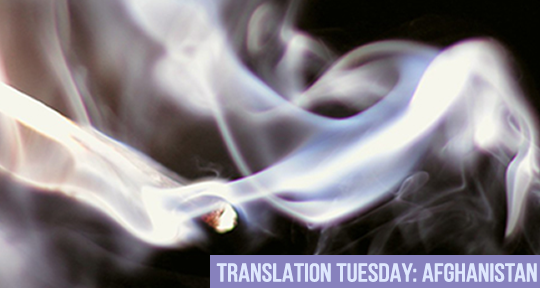This week’s Translation Tuesday features the devotional work of Nadia Anjuman. Under pressure, the poems sing out—but not so much to the divine Patriarch as do many religious songs. Created under political pressure in Afghanistan, Anjuman’s poems speak to a feminine subject free from repressive structures. When she says “If one strand of hope finds me” one gets the impression that the “me” is the subject who speaks free of the restraints of strict gender norms. The self is shuttled into wispy metaphors of string and haze, surviving, on the back of lyric, as opaque lightness. The style of Islamic mystics is breathlessly combined with resolutely feminist concerns—the result is a dire urgency. Anjuman ultimately died under the same oppression she was writing against, and her poems give testament to the pervasiveness and resilience of song. The stakes are high here—read carefully.
The Most Solemn Song
ghazal
I become smoke in my faith’s atmosphere
Slowly I twist and turn, then become nothing
While anxious hands care for me,
I become a pounding in the void of sleep
Then, aiming for that unfamiliar ditch of earth,
I become she who mounts the saddle of the fated moment of death
With the dry and mirage-like clouds’ love,
I become the hottest salt desert—
but if the memory of spring touches me
I become a river in the bed of thirst
If one strand of hope finds me
it weaves the weft on my heart’s warp, and I become a tapestry
But my muse left with no goodbyes
and again I become the memory of grief
The night also leaves, little by little,
and I become the most solemn song of farewell
Hoot 1381 / Pisces 2003
Asleep in a Haze
Mute pains—
pains that have stayed in the dim sheets of silence for too long
They recite deadly elegies in your mind
By showing their ugly faces
they have made the color fade from your life
Ugh
Despite your innocence, you are alone
No one notes the clever threads of suffering
running the veins of your body
No one notices the great focus
in your odd stare
No one retells
your lips’ night song
Even the soil
denies your eternal bond
Your childish thoughts are never spoken
No one reads the book of your heart’s happy anthems
You are asleep in a haze
No one will tear the dark curtains
from the columns of your home
No one will invite your closed lips
to the party where the nearly spoken is uttered
Don’t push off toward the sky
Don’t cry at the beautiful pain
of a star leaving its course
With your girlish coyness
no one will buy your gaze as probing and aware
so you are left outside life’s orbit
Aqrab 1381 / Scorpio 2002
Translated from the Persian by Marina Omar and Diana Arterian
As a teenager in Herat, Afghanistan, Nadia Anjuman attended the Golden Needle School. Women surreptitiously gathered to discuss literature with local professors under the guise of practicing needlepoint—one of the few pastimes for women approved by the Taliban government. In 2001, with Afghanistan’s liberation from the Taliban, Anjuman began attending Herat University and soon published a book of poetry entitled گل†دودی†(Gul-e-Dodi / Dark Flower). Her readership was not limited to Afghanistan—گل†دودی (Gul-e-Dodi / Dark Flower) found readers in Iran, Pakistan, France, and beyond. Anjuman continued to write poetry despite the objections of her husband and his family, and she was set to publish a second volume of poetry in 2006 entitled یک سبد دلهره (Yek Sąbad Délhoreh / A Wealth of Worry). In November 2005, Anjuman’s husband beat her and she ultimately died from the assault. In 2007, the Iranian Burnt Books Foundation published دیوان نادیا انجمن (Divane Sorudehaye Nadja Anjoman / The Complete Poems of Nadia Anjuman). گل†دودی (Gul-e-Dodi / Dark Flower) has been reprinted three times and sold over three thousand copies.
Diana Arterian holds a PhD in Literature & Creative Writing from the University of Southern California. Her work has been recognized with fellowships from the Banff Centre, Caldera, Millay Colony, Vermont Studio Center, and Yaddo, and her collaborative translations of Anjuman’s poetry have appeared in Apogee, Asymptote, Aufgabe, Brooklyn Rail, Circumference, Eleven Eleven, Exchanges Journal, International Poetry Review, and elsewhere. Born and raised in Arizona, she currently resides in Los Angeles where she is Director for Los Angeles Poet Laureate Robin Coste Lewis’ Poetic Truths & Reconciliation Commission: Los Angeles project.
Marina Omar was born in Afghanistan and has worked as an interpreter for Afghan refugee families. She is currently a Lecturer at the University of Virginia, where she earned her PhD in Foreign Affairs.
*****
Read more translations on the Asymptote blog:

